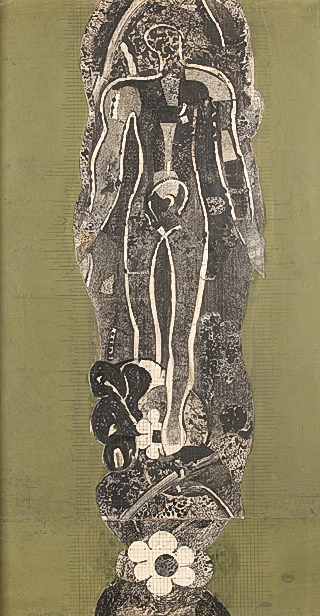

Keith Vaughan (1912-1977):
Adam, circa 1957
Framed (ref: 170)
Squared extensively, inscribed with colour and weaving notes
Collage, gouache, crayon and pencil, 42 x 23 in. (108 x 59.6 cm.)
See all works by Keith Vaughan crayon gouache pencil allegory Canney Abstract Art design
Provenance: The Earl of Bute; The Edinburgh Weavers' Collection, Carlisle; Austin Desmond
Literature: G Rayner, Artists' Textiles in Britain 1945-1970, 2003, reproduced in col., p. 77
Adam, commissioned by Alistair Morton for the Edinburgh Weavers' Collection, won the 1958 Design Centre Award for Best Woven Textile. It was produced to Vaughan's design as a Jacquard woven cotton and rayon 40-inch repeat. Other artists commissioned by the Edinburgh Weavers included Hepworth, Nicholson, Frink, and Scott; as such the company built up a reputation for cutting-edge design. Of the half-dozen designs that Vaughan made Adam is by far the most complex, and the only one for which the original design is extant. Some designs were used for cushions and curtains, a number of which decorated Vaughan's London flat.
In 1951 Vaughan made a 'Statement on Painting' in which he identified his 'leitmotif' as the interrelationship of nature and man: '. . .the folds of the shirt round the arm pit are the folds of the bark round the tree-joint. Hands are like leaves. The taut, tight curve of the spine is only warmed and more human than the curve of the tree trunk. Each part of the one is interchangeable with the other.' Modern British Painters, vol. 111, no. 2, Summer 1990.
Adam will be included in Tony Hepworth's forthcoming catalogue raisonné on Keith Vaughan.
We are grateful to Professor John Ball for his assistance.
Literature: G Rayner, Artists' Textiles in Britain 1945-1970, 2003, reproduced in col., p. 77
Adam, commissioned by Alistair Morton for the Edinburgh Weavers' Collection, won the 1958 Design Centre Award for Best Woven Textile. It was produced to Vaughan's design as a Jacquard woven cotton and rayon 40-inch repeat. Other artists commissioned by the Edinburgh Weavers included Hepworth, Nicholson, Frink, and Scott; as such the company built up a reputation for cutting-edge design. Of the half-dozen designs that Vaughan made Adam is by far the most complex, and the only one for which the original design is extant. Some designs were used for cushions and curtains, a number of which decorated Vaughan's London flat.
In 1951 Vaughan made a 'Statement on Painting' in which he identified his 'leitmotif' as the interrelationship of nature and man: '. . .the folds of the shirt round the arm pit are the folds of the bark round the tree-joint. Hands are like leaves. The taut, tight curve of the spine is only warmed and more human than the curve of the tree trunk. Each part of the one is interchangeable with the other.' Modern British Painters, vol. 111, no. 2, Summer 1990.
Adam will be included in Tony Hepworth's forthcoming catalogue raisonné on Keith Vaughan.
We are grateful to Professor John Ball for his assistance.
 British Abstract Art
British Abstract Art SOLD
SOLD



